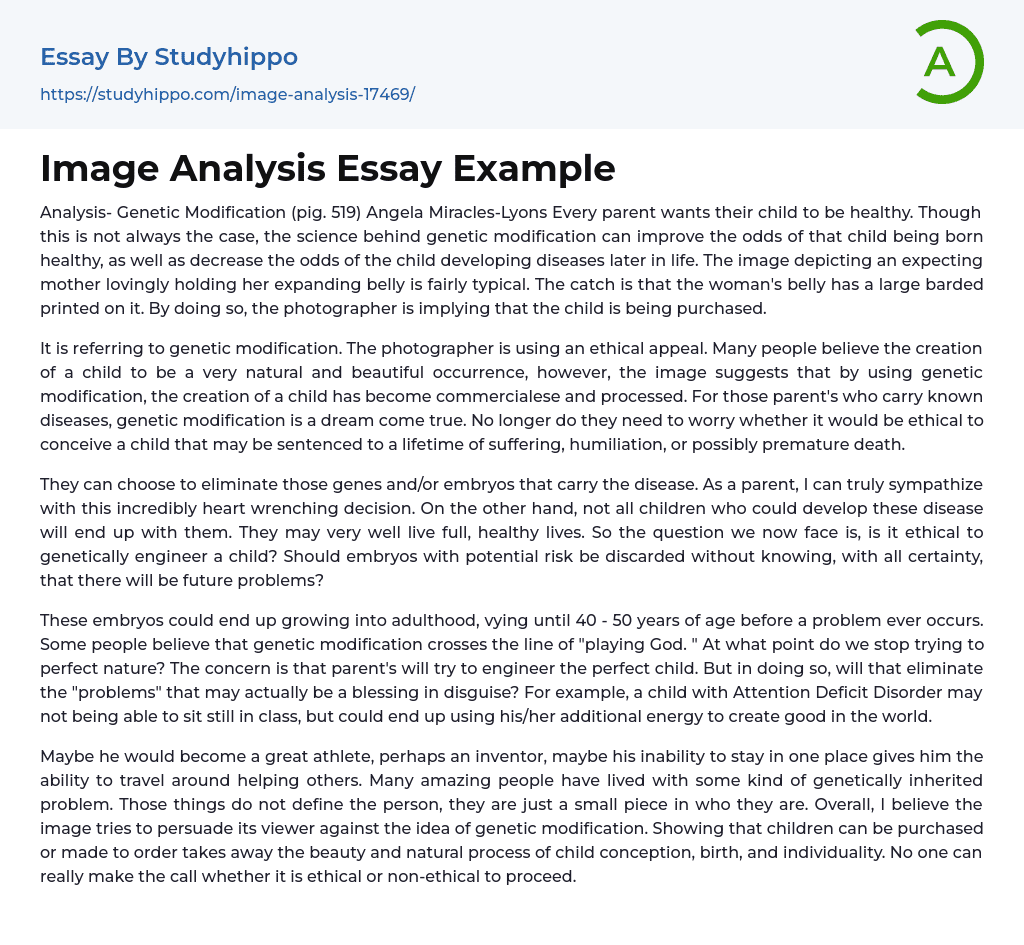Analysis- Genetic Modification (pig. 519) Angela Miracles-Lyons Every parent wants their child to be healthy. Though this is not always the case, the science behind genetic modification can improve the odds of that child being born healthy, as well as decrease the odds of the child developing diseases later in life. The image depicting an expecting mother lovingly holding her expanding belly is fairly typical. The catch is that the woman's belly has a large barded printed on it. By doing so, the photographer is implying that the child is being purchased.
It is referring to genetic modification. The photographer is using an ethical appeal. Many people believe the creation of a child to be a very natural and beautiful occurrence, however, the image suggests that by using genetic modification, the creation of a child has becom
...e commercialese and processed. For those parent's who carry known diseases, genetic modification is a dream come true. No longer do they need to worry whether it would be ethical to conceive a child that may be sentenced to a lifetime of suffering, humiliation, or possibly premature death.
They can choose to eliminate those genes and/or embryos that carry the disease. As a parent, I can truly sympathize with this incredibly heart wrenching decision. On the other hand, not all children who could develop these disease will end up with them. They may very well live full, healthy lives. So the question we now face is, is it ethical to genetically engineer a child? Should embryos with potential risk be discarded without knowing, with all certainty, that there will be future problems?
These embryos could end up growin
into adulthood, vying until 40 - 50 years of age before a problem ever occurs. Some people believe that genetic modification crosses the line of "playing God. " At what point do we stop trying to perfect nature? The concern is that parent's will try to engineer the perfect child. But in doing so, will that eliminate the "problems" that may actually be a blessing in disguise? For example, a child with Attention Deficit Disorder may not being able to sit still in class, but could end up using his/her additional energy to create good in the world.
Maybe he would become a great athlete, perhaps an inventor, maybe his inability to stay in one place gives him the ability to travel around helping others. Many amazing people have lived with some kind of genetically inherited problem. Those things do not define the person, they are just a small piece in who they are. Overall, I believe the image tries to persuade its viewer against the idea of genetic modification. Showing that children can be purchased or made to order takes away the beauty and natural process of child conception, birth, and individuality. No one can really make the call whether it is ethical or non-ethical to proceed.
- Emergence essays
- Anxiety Disorder essays
- Post-traumatic Stress Disorder essays
- Values of Life essays
- Ethical dilemma essays
- Normative Ethics essays
- Virtue Ethics essays
- Belief essays
- Deontology essays
- Moral essays
- Virtue essays
- Work Ethic essays
- Insanity essays
- Child essays
- Child labor essays
- Childcare essays
- Addiction essays
- Anatomy and Physiology essays
- Biodegradation essays
- Cancer essays
- Dental Care essays
- Disability essays
- Disease essays
- Disorders essays
- Health Care essays
- Infectious Disease essays
- Inquiry essays
- Intelligence Quotient essays
- Lung Cancer essays
- Medicine essays
- Neurology essays
- Nutrition essays
- Olfaction essays
- Physical Exercise essays
- Public Health essays
- Sex essays
- Women's Health essays
- World health organization essays
- Dna essays
- Gene essays
- Acceptance essays
- Age Of Enlightenment essays
- Child Observation essays
- Confucianism essays
- Conscience essays
- Critical Reflection essays
- Destiny essays
- Determinism essays
- Empiricism essays
- Environmentalism essays




